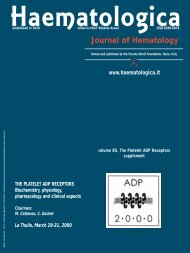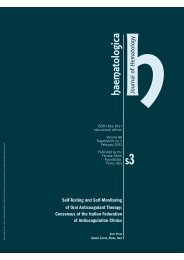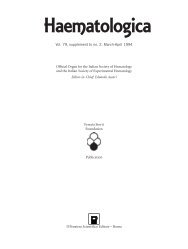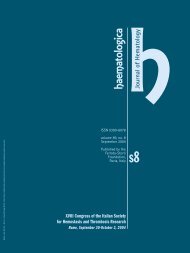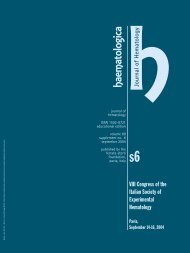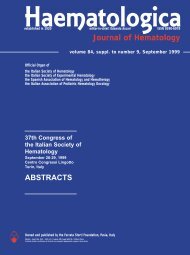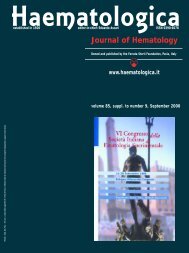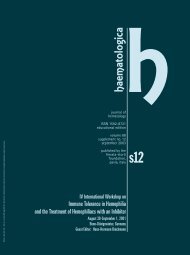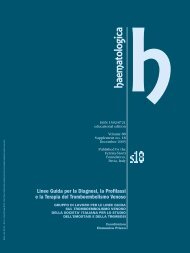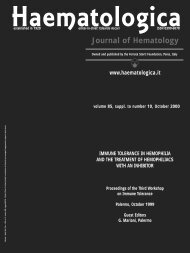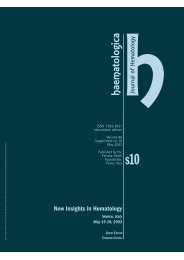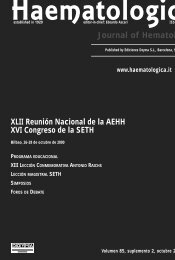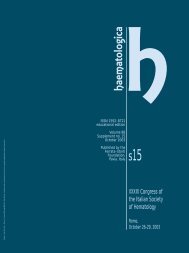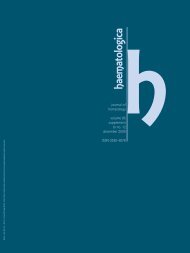Haematologica 2003 - Supplements
Haematologica 2003 - Supplements
Haematologica 2003 - Supplements
You also want an ePaper? Increase the reach of your titles
YUMPU automatically turns print PDFs into web optimized ePapers that Google loves.
Neutropenia, previously reported as a rare adverse effect in this<br />
setting, was not seen to date in our cohort. We have not observed<br />
progression of disease, although the median follow up is still<br />
short (10 months; range 5-30 months).<br />
Conclusions and Comments: Cuadruple maintenance treatment<br />
with bisfosfonates + INF + Dexamethasone + Thalidomide<br />
presents an acceptable tolerance. The different effects of each<br />
drug could induce a theorical multiple control over MRD by<br />
acting at different levels on the pathogenesis of MM.<br />
Thalidomide seems to be a safe drug in the post-transplant<br />
setting, perhaps adding effect to the response achieved posttransplant<br />
without major toxicity. Longer follow up and future<br />
randomized trials will be needed to validate the role of<br />
thalidomide and its long-term effect when used as maintenance<br />
therapy in the post-transplant setting and in prolonging the<br />
plateau phase of MM.<br />
References:<br />
A Alegre et al. Triple Maintenance Therapy (Pamidronate +<br />
Interferon + Dexamethasone) Post- Autologous Peripheral Blood<br />
Stem Cell Transplant ion (APBSCT) in Multiple Myeloma (MM)<br />
VII International Myeloma Workshop, Banff, Canada, 2001,145,<br />
P57<br />
346<br />
Maintenance or Salvage Therapy with Thalidomide<br />
Enhances Overall Survival following Autologous<br />
Hematopoietic Progenitor Cell Transplantation for<br />
Multiple Myeloma.<br />
S Lonial, B. Brinker, E.K Waller, A.A. Langston, I Redei, K<br />
Smith, S Bucur, E Winton, R. Lyles, L.T. Heffner<br />
Winship Cancer Institute, Emory University School of Medicine<br />
Autologous hematopoietic progenitor cell transplant (HPCT) has<br />
been proven to prolong survival for patients with multiple<br />
myeloma, and is a standard part of therapy for most newly<br />
diagnosed patients. While this therapy is well tolerated,<br />
ultimately it is palliative, as nearly all patients will eventually<br />
relapse. We have retrospectively analyzed the impact of<br />
maintenance therapy (planned) or salvage therapy with<br />
thalidomide (Thal) and its impact on overall survival following<br />
HPCT. Methods: 54 patients received busulfan,<br />
cyclophosphamide, and etoposide (Bu/Cy/VP-16) and 58<br />
received melphalan 200mg/m2 (MEL 200). All of the patients<br />
who received MEL 200 also received PBSC grafts, while 25 of<br />
the 54 recipients of Bu/Cy/VP-16 received BM grafts. . Patients<br />
were evaluated for disease status, overall survival, and relapse<br />
free survival based upon the last known documented follow up or<br />
restaging (for disease status). 12 patients received the<br />
combination of Thal/INF, 22 patients received Thal alone, 27<br />
patients received interferon alone, and 45 patients chose to<br />
receive no maintenance therapy at all. Thal doses ranged between<br />
100 and 400mg/day (median dose of 200mg/d) for a median<br />
duration of 8.5 months. Interferon doses were 3 million units SQ<br />
TIW for between 6 and 12 months post transplant as tolerated.<br />
Results: Statistical comparisons of both overall survival and<br />
progression free survival demonstrated no difference between<br />
patients who received either conditioning regimen. Median<br />
follow-up for the group as a whole was 18.5 months, 13.1 months<br />
for the group receiving MEL200, and 35 months for the group<br />
receiving Bu/Cy/VP-16. Median survival for the group as a whole<br />
was 51 months, with a predicted 5 year OS of 49%. We then<br />
evaluated the impact of post transplant therapy on overall<br />
survival. Median survival for the group receiving Thal or<br />
Thal/INF was 113 months, INF alone was 51 months, and the<br />
group that received neither Thal nor INF was 29 months<br />
(P=.0003 log rank test). In a multivariate analysis, factors which<br />
were significant for overall survival included response to<br />
transplant (p=.001), age



